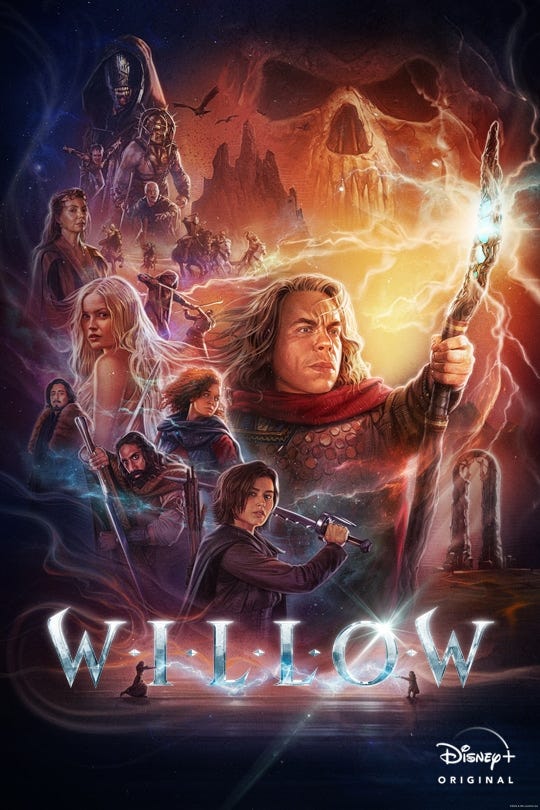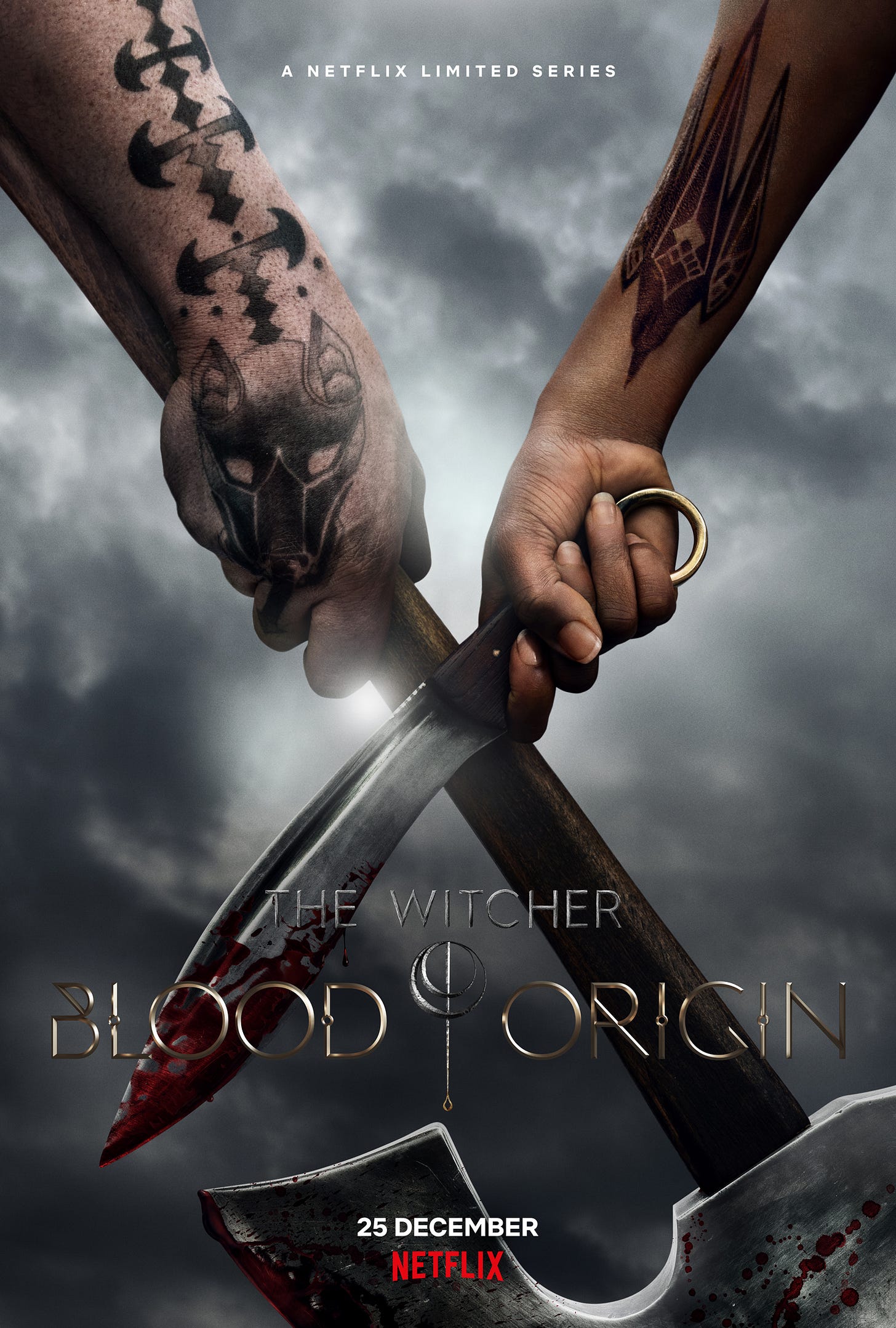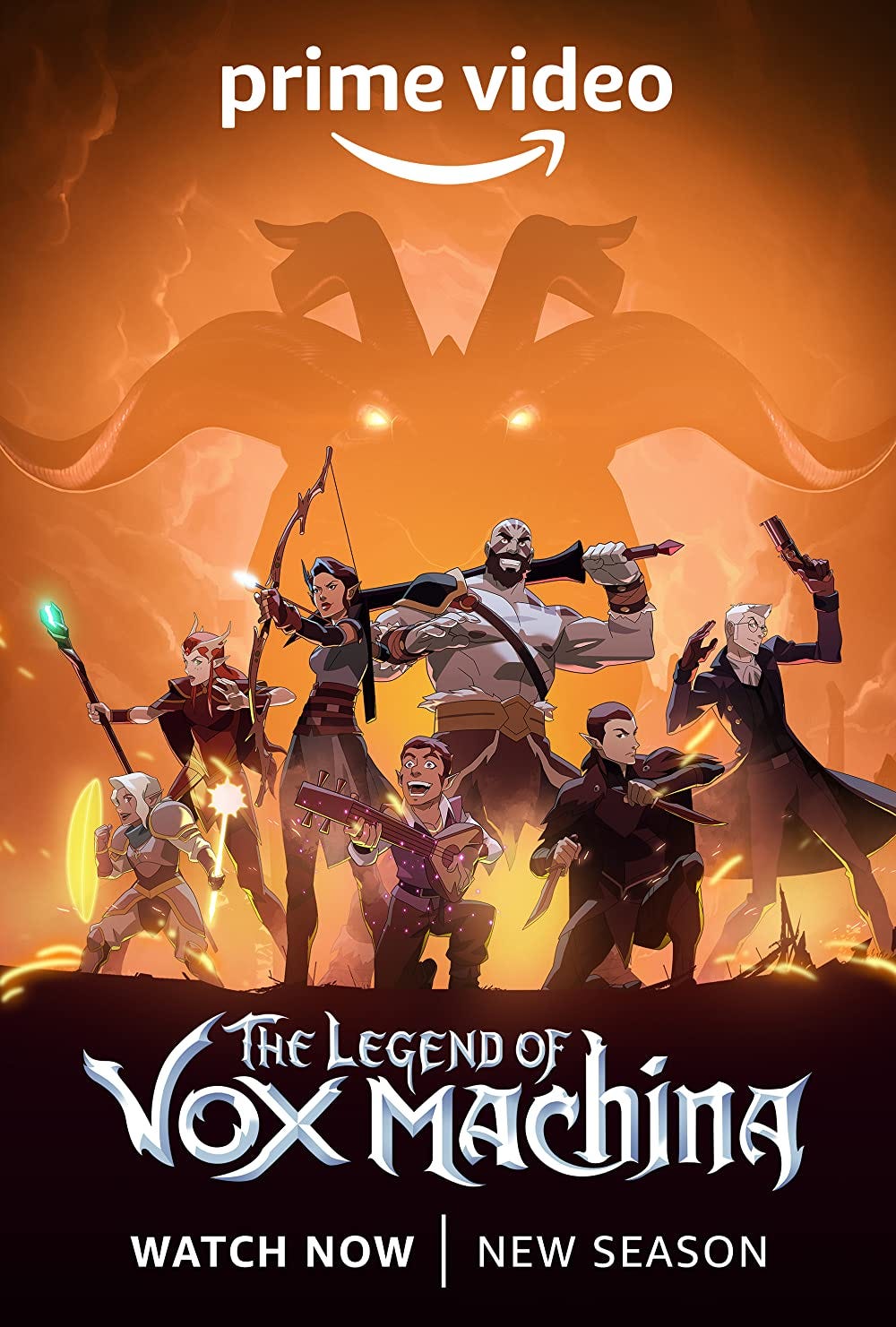My Week in Fantasy--February 2, 2023
It was a fun week in fantasy, with such TV delights as Willow and The Legend of Vox Machina occupying pride of place.
It’s no exaggeration to say that this was a particularly great week for me in terms of fantasy. I managed to finish up a couple of fantasy shows I’ve been making my way through, as well as at least one book. While, admittedly, not every one of the TV shows was quite as good as it probably could have been, I’m still grateful that we have so much speculative fiction storytelling currently on our screens.
Willow (Streaming On Disney+)
I’m one of those people who can actually remember watching the original Willow way back in the 1980s. I’m not sure that I’d go so far as to say that it’s a great film, but it is certainly an entertaining one. It is very much a product of its time, with all of the trappings of a certain kind of old-fashioned fantasy that has largely been tossed aside in favor of grittier fare.
Fortunately, the Disney+ series, which takes place several years after the film, manages to stay true to its roots while also establishing its own identity. As its title suggests, it focuses on our beloved Willow–once again played by Warwick Davis–who takes Elora Danan, now a young woman–under his wing as they set out to rescue a prince from a malevolent entity known as the Crone.
The story that Willow tells is a pretty conventional quest narrative, and it seems to play fast and loose with its own internal mythology, in that there are new concepts and creatures and beings introduced with almost every episode. What it lacks in an internal consistency, however, it more than makes up for with its central characters. Davis is suitably fussy and sometimes insufferable as Willow, but he remains a moral constant. The younger cast members are quite strong, and I was particularly impressed with the queer relationship between Princess Kit and her bodyguard, Jade. The towering lunk Thraxus Boorman is some much-needed comic relief (and he’s really hot, too), and Prince Graydon is suitably doe-eyed and tragic. Rounding out the main cast are Elora Danan herself and the captured Prince Airk, both of whom are perfectly cast as young innocents who find themselves caught up in great events.
The series does have its oddities, and it is particularly prone to abrupt changes in tone that can be quite disorienting. However, it is just so much damn fun that you can’t help but go along for the ride. It’s the kind of series that doesn’t really need to make a whole lot of sense (narratively and mythologically speaking) to still work. What’s more, there’s genuine warmth and human magic here, and you can’t help but love and care about all of these characters. The season ends on something of a cliffhanger, so let’s hope Disney does the sensible thing and gives it a second season, so that we can spend more time in this strange and magical world.
Agent of Byzantium (By Harry Turtledove)
I’ve always found the genre of alternate history to be one of the most compelling and fascinating of speculative fiction iterations. Something about the idea that history could have been very different but for a few chance events appeals to me, and there are few writers who are as expert in this particular area as Harry Turtledove.
In Agent of Byzantium, he presents a world in which the Byzantine Empire, rather than being severely wounded and limited by the rise of Islam and its armies, has instead flourished. Each of the stories in this collection focuses on the adventures of Argyros, a soldier turned spy who repeatedly finds himself enmeshed in the most important threats facing the empire, from both without and within. In particular, they have to contend with the Persians, who remain an adversary (they, too, never fell to the conquering Arab armies).
As the story proceeds, Argyros plays a key role in the development of significant discoveries, including a vaccination for smallpox (a disease which carries away his wife and young child), the telescope, and even gunpowder and the printing press. There are a few times where it strains credulity that one person, no matter how well-connected they might be with the imperial administration, could possibly be so intimately bound up with the intellectual advances of the age but, then again, if Byzantium had been allowed to flourish rather than constantly playing defense, who’s to say that it might not have experienced a moment like the Renaissance in our world much earlier?
Turtledove has a knack for immersing us in the world of the Byzantine Empire, creating a nation that is at once both like and unlike the one which existed in the real world. This is no doubt due to the fact that, before he turned to writing fiction, he earned a PhD in Byzantine history. There is a texture and a believability to his world that makes you feel as if you are walking with Argyros as he contends with such varied crises as religious upheaval, barbarian invasions, and striking workers. Perhaps most importantly of all, Argyros is someone that it’s nice to spend time with. He’s a little like the hero of a classic film noir or hardboiled detective novel, though he’s not nearly as cynical or worldweary as his forebears, even if he certainly has reason to be so.
The Witcher: Blood Origin (Streaming On Netflix)
Like a lot of other people, I was really quite smitten with The Witcher when it premiered in 2019, and though the second season lacked some of the appeal of the first, I still quite liked it. Thus, I was quite excited about the prequel series The Witcher: Blood Origin, which sets out to tell the story not just of how the first witcher came to be but to also shed light on the cataclysmic event known as the Conjunction of the Spheres. When I found out that it was also going to have Michelle Yeoh in it, my excitement reached fever pitch.
And then I actually watched the show, and it all evaporated.
Part of the problem, as many critics have pointed out, is that it’s generic in all the worst ways. There is only the most tangential of relationships to the parent series–mostly names that viewers might find vaguely familiar–and this is a significant problem. It’s hard to get truly invested in a prequel fantasy series if you can’t really see how it connects to the original.
However, the problem goes deeper than that. Blood Origin tries to do a lot in terms of its story, but it quite simply doesn’t have enough episodes in order to do any of them justice. The characters are almost universally bland, and the story rushes from one event to the next without ever giving the viewer a chance to pause, get their breath, and consider the consequences of what they’ve just seen. Even more perniciously, we’re never really allowed to get to know these characters, let alone to become invested in their stories, their lives, and their desires.
Ultimately, Blood Origin becomes one of those series that it is very easy to simply skip. It lacks any true substance, value, or heft, and though there are a few suggestions that some of its ancillary characters will have some impact on the main storyline, something tells me that these aren’t going to pay off in a way that will reward anyone who decided to sit through the four episodes of this series. It’s my earnest hope that, going forward, Netflix will see fit to give future spinoffs (assuming that there are any, given the truly toxic reception that greeted Blood Origin) far more resources.
The Legend of Vox Machina (Streaming on Prime Video)
I really loved the first season of The Legend of Vox Machina. It was delightfully irreverent, breathlessly paced and, of course, brilliantly animated. At the end of the first season, it seemed as if all was going to finally work out for the titular group until, that is, a group of dragons came swooping in to destroy everything. The second season begins right where the first one left off, with the dragons–here revealed to be a group known as the Chroma Conclave–determined to wreak havoc. Vox Machina, never ones to let a challenge go unanswered, set off on a quest to find a means of defeating them
As with the first season, there’s much to love about Vox Machina. The voice-acting continues to be top-notch, as does the animation. More importantly, this is the kind of fantasy story that you can really immerse yourself in; each episode does a fine job of both carrying the story forward while also revealing more and more about these various characters and their backstories. In fact, I think we learn more about these lovable rogues in the first few episodes of the second season than we do in the entirety of the first. In that sense, it couldn’t be more of a contrast to Blood Origin, and it’s a good example of why fantasy series really should be given enough room to breathe.
What I find particularly refreshing about Vox Machina is how effortlessly it moves between its different affective registers. It can be crude and crass in one moment and then, in the blink of an eye, it can be deeply tragic and even beautiful. It handles these shifts with a little more grace than Willow, and I think that’s because, as a whole, Vox Machina feels much more comfortable with its material. It knows why people are tuning in to its series, and it more than delivers on its promise.
With the success of Vox Machine–which has already been renewed for a third season–I’ve begun to think that fantasy and animation are truly a match made in heaven. We’re so used to seeing big live-action adaptations such as The Lord of the Rings: The Rings of Power, House of the Dragon, and The Wheel of Time, but this series shows us that there’s something inherently magical about traditional animation, which makes it a natural home for epic fantasy adaptations. Let’s hope that this trend continues in the future.
So, there you have it, this week’s fantasy outings. I’ve got a whole bunch of books that are almost finished, so stay tuned for some bite-sized book reviews (and maybe even some longer ruminations) in the weeks to come!







